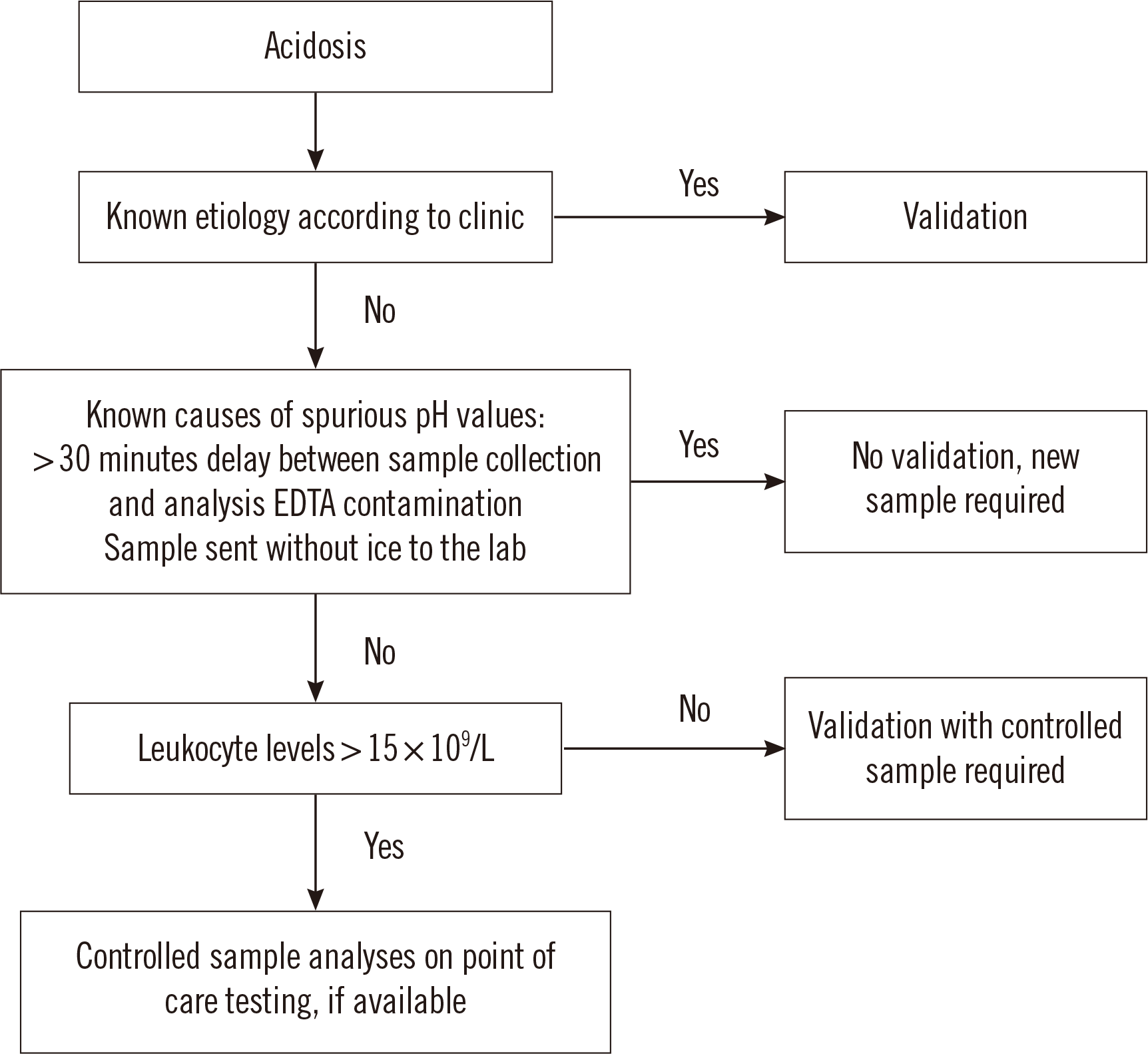Dear Editor,
Arbiol-Roca, et al. [1] recently published an article titled “Stability of pH, blood gas partial pressure, hemoglobin oxygen saturation fraction, and lactate concentration” in the Annals of Laboratory Medicine. The authors reported that the stability of blood gas parameters primarily depends on the blood sample storage temperature and time. Therefore, they recommended storage under strict temperature and time criteria (0–3.9°C, 45 minutes) for determining pH, partial pressure of CO2 (pCO2) and oxygen (pO2), hemoglobin oxygen saturation (sO2), and lactate concentration in blood gas syringes. However, the authors did not consider that leukocyte count also impact blood gas parameter stability. Our previous research showed that modest leukocytosis (i.e., leukocyte count >15×109/L) impacts the stability of glucose and pH in blood samples [2]. We observed that the pH decreased over time in samples with leukocytosis when compared with samples without leukocytosis. A significant positive correlation was observed between leukocyte count and a pH change over time (r=-0.707; P<0.0001), but not between leukocyte count and a change in pO2 (r=-0.167; P=0.121) or pCO2 (r=0.134; P=0.348) over time. The larger decrease in pH in cases of leukocytosis might be due to a higher leukocyte glucose metabolism, contributing to increased lactate production and thus promoting acidosis. Other studies have shown that severe leukocytosis led to rapid O2 consumption, which can cause false hypoxemia [3, 4]. Therefore, the storage criteria recommended by Arbiol-Roca, et al. [1] may not be sufficient to manage stability.
In cases of low pH, in the absence of clinical signs and/or an obvious cause of a spurious pH value, we suggest checking leukocyte count. Spurious pH values can be caused by a delay (longer than 30 minutes) between sample collection and analysis, EDTA contamination, or inappropriate sample transport [1, 5]. When the leukocyte count is >15×109/L, we suggest using point-of-care testing (POCT) to measure blood gas parameters to avoid spurious results (Fig. 1). The use of a POCT device reduces preanalytical transport-related issues and the time to measurement, thus reduces the impact of leukocyte counts on the stability of blood gas parameters [6, 7]. We wanted to provide a reminder of the significant impact of leukocyte counts on the stability of blood gas parameters and recommend considering leukocyte measurement in future studies and clinical practice.
Notes
REFERENCES
1. Arbiol-Roca A, Imperiali CE, Dot-Bach D, Valero-Politi J, Dastis-Arias M. 2020; Stability of pH, blood gas partial pressure, hemoglobin oxygen saturation fraction, and lactate concentration. Ann Lab Med. 40:448–56. DOI: 10.3343/alm.2020.40.6.448. PMID: 32539300. PMCID: PMC7295962.



2. Grzych G, Roland E, Beauvais D, Maboudou P, Lippi G. 2020; Leukocytosis interference in clinical chemistry: shall we still interpret test results without hematological data? J Med Biochem. 39:66–71. DOI: 10.2478/jomb-2019-0005. PMID: 32549780. PMCID: PMC7282239.



3. Malek T, Chen L. 2019; Spurious laboratory values in patients with leukocytosis. Crit Care Nurs Q. 42:44–6. DOI: 10.1097/CNQ.0000000000000236. PMID: 30507663. PMCID: PMC7528080.



4. Van de Louw A, Desai RJ, Schneider CW, Claxton DF. 2016; Hypoxemia during extreme hyperleucocytosis: how spurious? Respir Care. 61:8–14. DOI: 10.4187/respcare.04196. PMID: 26420901.

5. Grzych G, Maboudou P, Brousseau T. 2020; Factitious severe acidosis in a patient, preanalytical considerations and prevention. Clin Chem Lab Med. 58:e100–1. DOI: 10.1515/cclm-2019-0963. PMID: 31639102.

6. Grzych G, Roland E, Lezier D, Beauvais D, Maboudou , Brousseau T. 2019; Benefit of point of care testing in patients with major hyperleukocytosis. Clin Biochem. 65:55–7. DOI: 10.1016/j.clinbiochem.2018.12.011. PMID: 30592987.

7. Auvet A, Espitalier F, Grammatico-Guillon L, Nay MA, Elaroussi D, Laffon M, et al. 2016; Preanalytical conditions of point-of-care testing in the intensive care unit are decisive for analysis reliability. Ann Intensive Care. 6:57. DOI: 10.1186/s13613-016-0152-6. PMID: 27342259. PMCID: PMC4920790.







 PDF
PDF Citation
Citation Print
Print




 XML Download
XML Download